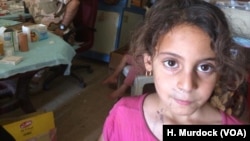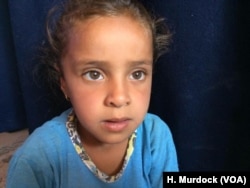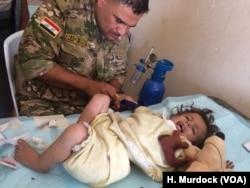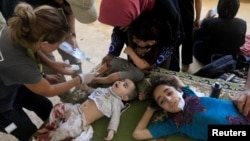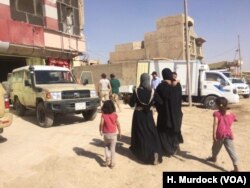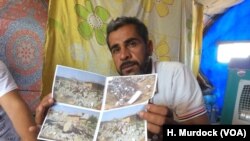“My son Momin liked to play with his spinning top all the time,” says Zamin Makhool, 28, sitting on the floor of her sweltering tent with wet concrete floors in a refugee camp near Mosul. “He was four years old and he was carrying his top when it happened.”
She had put Mayada, her nine-month-old daughter, down for a late morning nap when she heard the first blast. It was last December, and her neighborhood was still firmly held by Islamic State (IS) militants. Makhool ran to the door and saw parts of a building crash into the street.
The next strike hit her house, leaving it in a pile of rubble and a hole three meters deep.
Neighbors found the body of four-year-old Momin later that day on the roof of a home two doors down. Baby Mayada was crushed under the collapsed house.
More than 1,000 children have been killed in Iraq since 2014, when IS militants swept into the country, claiming territories, including Mosul and other major cities, according to the United Nations Children's Fund, or UNICEF. More then 5 million children are in need of emergency humanitarian relief.
“Across Iraq, children continue to witness sheer horror and unimaginable violence,” Peter Hawkins, a UNICEF representative in Iraq, said in a statement. “They have been killed, injured, abducted, and forced to shoot and kill in one of the most brutal wars in recent history.”
Starving and injured
In a field hospital near the Old City, where fighting still rages in IS’s last Mosul stronghold, a few families arrive, having risked their lives to flee the area.
Saja is just over a year old, and her mother says the child hasn’t been fed properly in months. Doctors try to inject her with nutrients but struggle to find veins in her starved body that are strong enough to accept a needle.
“Even the families of militants are trying to flee the Old City now,” says Umm Saja, her mother. “It’s too dangerous.”
The day before, militants had heard her family was planning to run away and shot her husband in the house. Umm Saja left his body where it fell and sneaked out of the IS-held neighborhood with her children.
In the current battle for western Mosul, militants are killing not only parents but children to punish families fleeing and deter others from making an attempt, according to UNICEF and fleeing civilians.
Mortars, airstrikes and IED's also do not spare children, but starvation and disease take them before the adults.
More than 1,100 children have been injured in the IS conflict in Iraq, according to UNICEF, and that’s just the children they know of.
Chaos
The fighting in Iraq has displaced more than 1.5 million children in the past three years, UNICEF said. Families are gathered in massive desert camps that surround Mosul, as the hot weather drags on with temperatures reaching at least 40 degrees Celsius (104 degrees Fahrenheit) almost daily.
In the camps and Iraqi-controlled Mosul, poor food, dirty water and lack of health care are rampant, Maj. Mohammad Hassan Abdullah, a medical doctor with the Iraqi Army’s 9th Division, said.
“We have 500 to 600 people coming in every day, mostly babies and elderly people,” he says at a field clinic near the front lines in Mosul. “The problem could nearly be solved with clean water.”
At the Hammam Alil Camp, Zamin Makhool feeds her one remaining living daughter with handouts from NGO’s that come sporadically, and some days, not at all.
As long as IS militants hold territory in Iraq, the violence against children will continue, says Zamin’s husband, Ibrahim Makhool.
He was trying to sell his car when his children were killed in the airstrike, apparently meant to target nearby IS bases or a house next door where militants were living.
“It wasn’t a mistake that airstrikes hit our neighborhood,” Ibrahim Makhool says, holding up a picture of a pile of rocks from what was once his home. “There were three IS bases in the area.”
“They live between families to try to stay safe,” he adds. “Then when we are hit, they move on.”
IN PHOTOS: UNICEF: Iraqi children 'witness sheer horror and unimaginable violence'




